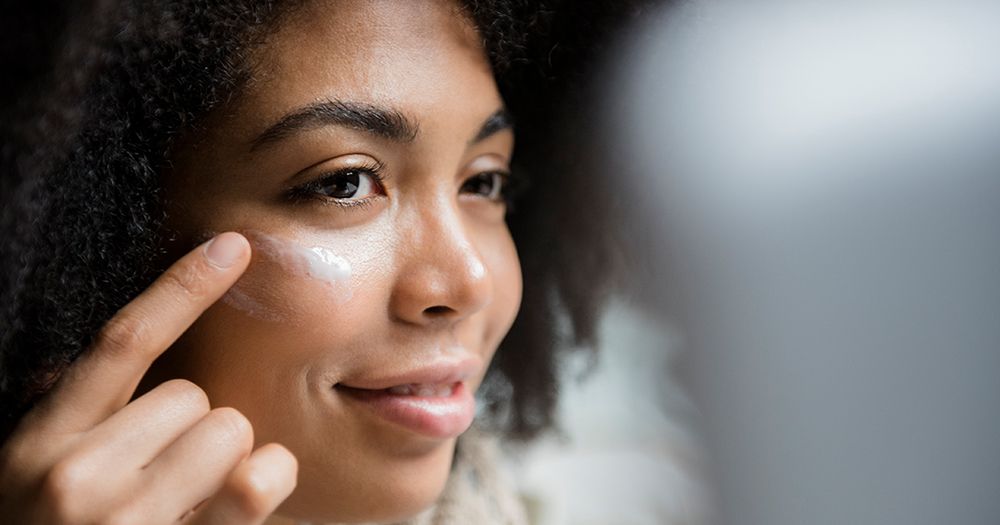Photo: JGI / Jamie Grill / Getty Images
In the world of anti-aging skin-care ingredients, there are some major players experts talk about all the time: retinol, hyaluronic acid, and antioxidants. And while peptides aren't necessarily always at the top of the list, they're more commonly used (and more effective) than you may think. Ahead, top dermatologists answer all of your peptide questions.
WHAT ARE PEPTIDES?
"Peptides are chains of amino acids that are the building blocks of protein in the skin," explains dermatologist Rhonda Klein, M.D., partner at Modern Dermatology of Connecticut. These short chains are able to penetrate the top layer of the skin, where they go to work delivering their anti-aging benefits, such as helping stimulate collagen production and fight fine lines and wrinkles.
HOW DO PEPTIDES WORK IN SKIN CARE?
Generally speaking, peptides act as signaling mechanisms that tell the body to produce more collagen, says Dhaval Bhanusali, M.D., a dermatologist based in New York City. (As a reminder, collagen is the protein responsible for strong, firm, youthful skin, so more collagen equals fewer wrinkles. See: Why It's Never Too Early to Start Protecting the Collagen In Your Skin) Still, there are different types of peptides, all of which work slightly differently. Some peptides, called hexapeptides, have a relaxing effect on your facial muscles, helping to minimize movement and the formation of wrinkles in a way similar to Botox, says Dr. Klein.
WHO SHOULD USE SKIN-CARE PRODUCTS WITH PEPTIDES?
You probably haven't met anyone who doesn't want smoother, firmer skin. So really, anyone can benefit from using them, even as a preventative measure. And here's the biggest pro when it comes to peptides: Pretty much anyone and everyone can use them. Unlike many other collagen-boosting ingredients-retinoids, even vitamin C-which can often have irritating side effects, peptides are generally fairly well tolerated by everyone, notes Dr. Bhanusali. While you should always check with your ob-gyn, they're typically okay to use during pregnancy, too. (Related: Safe Skin-Care Products for Pregnant Women)
HERE'S HOW TO CHOOSE THE RIGHT PEPTIDE SKIN-CARE PRODUCT.
This can get tricky because peptides are one ingredient where it can be tough to determine what you're actually getting. "Given that you can call any short chain of amino acids a 'peptide,' many of the products out there tend to be more about marketing hype than actual efficacy," says Dr. Bhanusali.
To ensure you're getting the most bang for your buck, he suggests choosing peptide products from science-based brands that conduct studies to back up their claims. And while you can find peptides in all kinds of topicals, the dermatologists we spoke with unanimously agree that it's best to look for them in a serum. Not only will these contain a higher concentration of peptides, they're also better able to penetrate the skin than thicker moisturizers.
It's also helpful to seek out specific types of peptides, depending on your skin goals, says Dr. Klein. Pentapeptides induce and stimulate new collagen growth; hexapeptides may help relax wrinkles; palmitoyl oligopeptide and palmitoyl tetrapeptide-7 promote the production of collagen and hyaluronic acid and help protect against UV damage, as well as fight inflammation; copper peptides enhance regeneration and healing, as well as increase skin elasticity and firmness.
SO, SHOULD YOU START USING PEPTIDE SKIN-CARE PRODUCTS?
At the end of the day, you have nothing to lose by incorporating peptides into your existing anti-aging regimen. While retinoids remain the wrinkle-fighting gold standard, if you can't tolerate them, peptides are a great replacement. But, even if you're already using a retinoid, a peptide-based product will be a nice complement to your current skin-care lineup.






